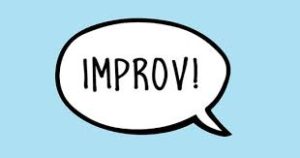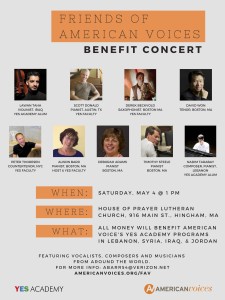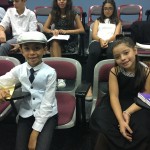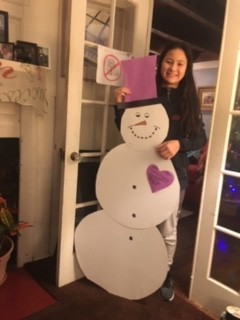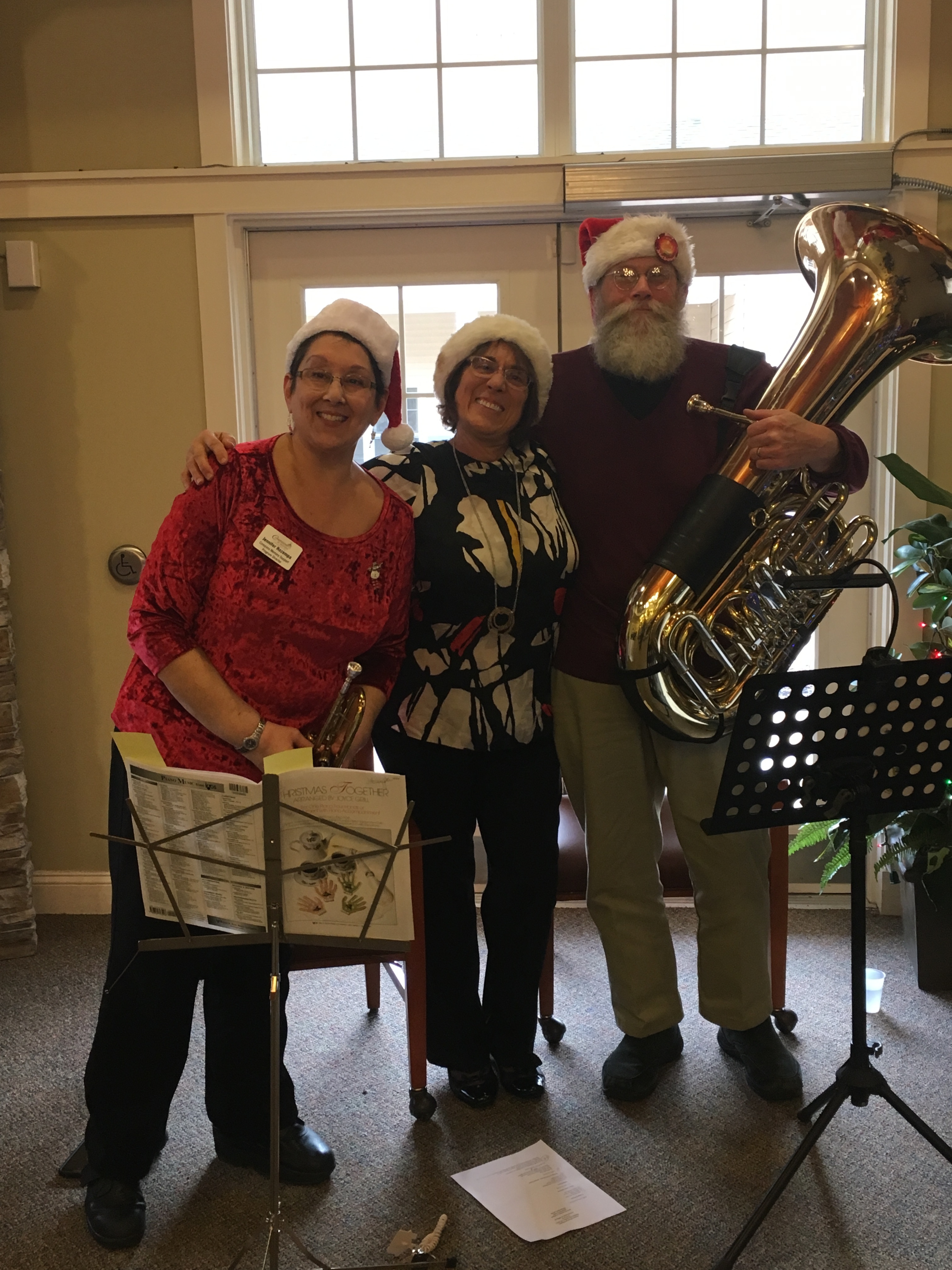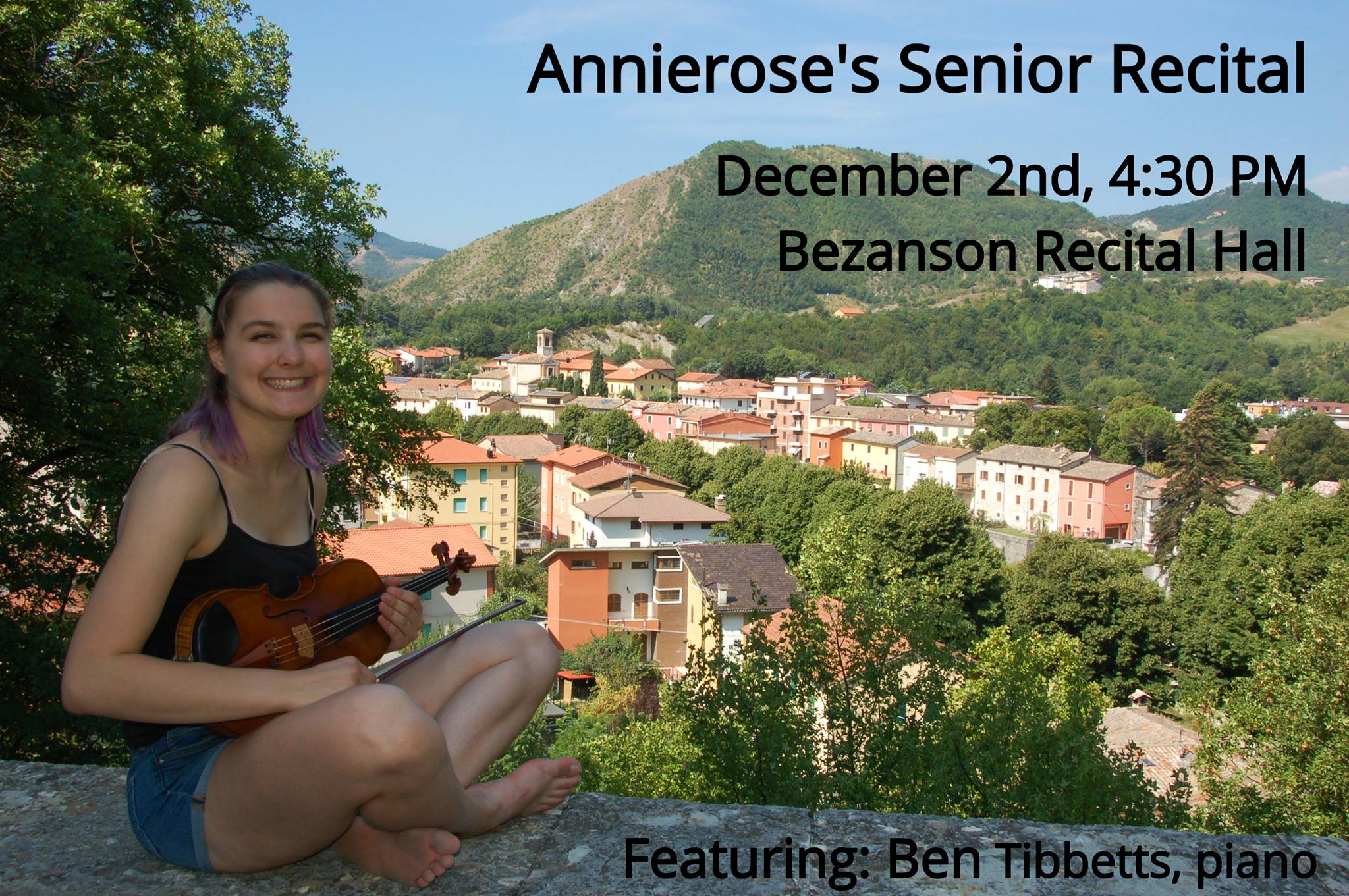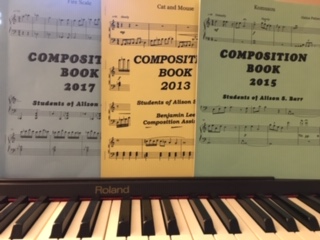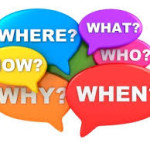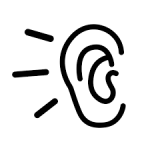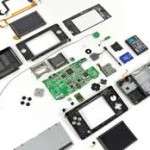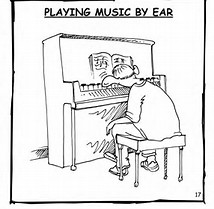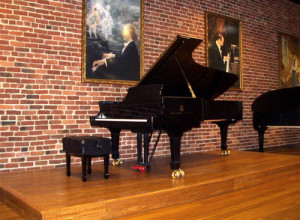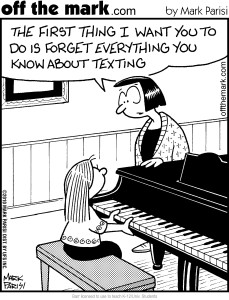Creative Practicing Blog – Session 1, Week 4 – September 27, 2020
Transitions can be exciting and they also can be tough. Whether you are a younger student, high schooler or adult, you are experiencing a new, maybe tougher, routine than you have ever had before. It’s not easy to adjust, even if you have the best attitude in the world. Remember, if you need a break, piano is always there for you, something tried and true.
Look for transitions in your music, places where the composer decided to leave one musical idea and try another – is this spot harder to learn than other places? Is it worth getting through so you can experience what comes later in the piece? We can always look back on transitions and see how far we have come!

Creative Practicing Blog – Session 1, Week 2, September 13, 2020
The BLOG is back! I am thrilled to see you all and to enjoy the improvements you’ve made to your lesson environments with piano tunings, mics, even a NEW piano in one case!
Here are some photos from around the “Studio.” Please send me a selfie of you and your piano area and I’ll post them on the bulletin board for one grand photo display!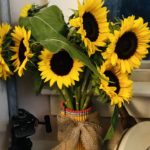
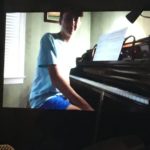
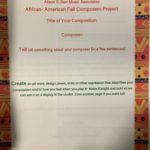


Here are some highlights from the beginning of the year:
Sunflowers and pencil vase from Christian!
Seans and his new (to him) piano!
African American Music Project
Bulletin Board for your Photos
Photo of Mrs. Barr
Have fun getting started and don’t forget to email me your photo!
Creative Practicing Blog – Session 3, Week 7, April 19, 2020
Dear Students-
It is a privilege to teach you! The online teaching has made me realize, even more so than before, that you are wonderful human beings and that you all enjoy having the piano in your lives. When things are not so frantic, without all the rushing from place to place, music can take a more central role. You’ve found that piano is something you can easily access in your home, on your own time. Thanks for your dedication!
Here is this week’s piece:
Robert Schumann’s “Knight of the Hobby Horse”
Robert Schumann lived in Vienna, Austria from 1810 – 1856. This piece is from a collection called Scenes from Childhood
Creative Practicing Blog – Session 3, Week 6, April 13, 2020

By the end of this week, we will have had FIVE full weeks of online lessons! You have done an absolutely amazing job with it. Now, you would normally have a break for a week. You are all doing so well, I thought I’d just continue as usual!!! I know all the screen time may be tiring, but piano is a wonderful break from that!
Here are some great things to do other than your assignments:
Play some of your favorite “old” pieces
Sightread!
Listen to a concert online.
Learn a new piece on your own
Practice your scales in new ways (not kidding!)
Arrange with Mrs. Barr for a slot to watch the webinar “What Could Beethoven Really Hear?” – a very interesting webinar. It takes about 30 minutes.
See you next week!
Piece of the week: “Elfin Dance” by Edvard Grieg, 1843-1907, Norway
Creative Practicing Blog – Session 3, Week 5. April 4, 2020
Aren’t these felines having a blast? I think they’re practicing more due to being at home, and many of you are, too!
This week, I’m starting a new listening feature that will be introduced in the blog. This week, I’ll play a piece by Norman Dello Joio, who lived from from 1913 – 2008 in New York, much of it in New York City. His music is very descriptive and makes us think about a specific scene or character. We call this “program” music. See what you hear in this piece, called Street Cries.
You can hear fish and produce mongers letting people know they are in the neighborhood and, if you listen very carefully, you can even hear a quote from a famous Broadway song!
Have fun listening!
Creative Practicing Blog – Session 3, weeks 3 and 4, March 23 and 30, 2020 I could not be prouder of all of you! Last week’s remote lessons were 100% wonderful, enthusiastic and amazing. Here are some things I learned:
I could not be prouder of all of you! Last week’s remote lessons were 100% wonderful, enthusiastic and amazing. Here are some things I learned:
1. You all care about continuing piano through this not-so-normal time.
2. You’re all quite good at technology.
3. You have great support from your parents, who helped many of you set everything up.
4. Everyone had materials all ready, good lighting and a pencil on hand!
Let’s keep this positive trend going and see it as a golden opportunity for growth during an unusual time.
Soon, I’ll be launching Music Enrichment Mini- Sessions that everyone can take advantage of – my first topic will be “What Could Beethoven Really Hear?” I’m working on it now.
Please hang ion there with all the changes going on, stay well and keep practicing. “See” you this week!
Mrs. Barr
Creative Practicing Blog – Session 2, week 12; Session 3, week 1, March 1/8, 2020 There is nothing like hearing an amazing musician LIVE. I just heard this pianist at the Gardner Museum in Cambridge. His name is Nicolas Namoradze. He is in his twenties and won an important piano competition in 2018. Because of that, he gets concert dates at the most famous venues all over the world!
There is nothing like hearing an amazing musician LIVE. I just heard this pianist at the Gardner Museum in Cambridge. His name is Nicolas Namoradze. He is in his twenties and won an important piano competition in 2018. Because of that, he gets concert dates at the most famous venues all over the world!
Here’s what he sounds like:
https://www.youtube.com/watch?v=XGnI8f5ryOM
Just like when you go to see a professional sports team play the sport you like best, it’s great to hear and see an accomplished pianist play. It inspires you, gives you something to work towards and puts the sound of amazing playing in your ear. We have great concerts all around us. It’s so easy to find them! Here’s a link to some that are coming up:
https://calendar.artsboston.org/categories/classical/
Please let me know if you need help finding a concert to attend!
Creative Practicing Blog – Session 2, week 10/11, February 9/23, 2020
A lot of piano teachers claim that their lessons are great FUN! And they think that if it isn’t “fun,” students aren’t going to want to learn, they aren’t going to practice and they will eventually quit. That is probably true for some students. Maybe they are looking for piano “lite,” where they don’t have to put anything in and they really don’t get anything out either.
It can be “fun,” satisfying, fulfilling and rewarding when you work hard to learn something and know you can play it well, but practicing piano is sometimes not “fun.” We need to find our joy in the journey, asking questions like:
Did some small thing sound better today?
Did I concentrate long and well enough to fix spots that have been a problem?
Did I work through any boredom I might have felt, getting to mastery and reward?
Did I set goals that I could accomplish, studying problem spots until I had a better grasp?
I guarantee that if you commit to deep and concentrated practice, the “fun” will follow!
Creative Practicing Blog – Session 2, week 9, February 2, 2020
Dear Students –
Congratulations! to those of you who kept going, assigned yourselves more music and continued to improvise even though you missed a private lesson and then had a Group Week without a private lesson.
That was EXACTLY what you should have done! Any time you are unsure about an assignment or what to do, give yourself more – a new scale, a new piece (from one of your current books!) a new improv idea added into the old. There’s always so much to do! Carry on and you’ll never be bored!
Creative Practicing Blog – Session 2, week 8, January 27, 2020
Everyone’s working on improvs now! What great Group Classes last week! Let’s think about how we can make our improvs more original, deeper and more flexible.
Here are some strategies:
- Believe that you can improvise. …
- Play along with songs you like. …
- Mess with the melody. …
- Mess with the rhythm. …
- Try reacting to what’s around you. …
- Embrace the accident. …
- Don’t judge yourself in the moment…
- from Disc-Makers Blog
Creative Practicing Blog – Session 2, week 5 January 5, 2020
So much excitement in this New Year!
January 10, 2020 at 7:00 p.m.
James Library, 24 West St., Norwell (off of Norwell Center)
Studio Recital!
Warm-up starts at 6:00 p.m. (anytime from 6:00 – 6:45 p.m.)
Remember to breathe slowly and deeply while waiting for your turn to play. Enjoy everyone else’s playing and notice things that sound wonderful!
Remember that a recital is about sharing your music and conveying your expression to the people in the audience! Relax and have a blast!
Creative Practicing Blog – Session 2, week 3/4 December 15, 2019
Happy Birthday, Beethoven!
Ludwig van Beethoven was born in Bonn, Germany, in December of 1770. He was baptized on December 17, so it is likely that he was born shortly before that date. He died in 1827. He was celebrated as a genius during his own lifetime. That had not been the case for other composers before him. Most people know that Beethoven was deaf. He became completely deaf in his 40’s, but by the time he was 31, he had lost 60% of his hearing. There are many theories as to how he lost his hearing. Perhaps it was from a combination of untreated childhood illnesses like rheumatic fever, poor lifestyle habits, and the presence of lead in all the liquids he drank. He also suffered from many chronic diseases. Still, he composed until very near the end of his life. He sawed the legs off his pianos so that he could sit on the floor and feel the vibrations of the sound waves as he played. His tenacity and unwillingness to let his deafness overcome him gave us some of the greatest works of music that exist to this day! Go, Beethoven!!!!!!!!
Creative Practicing Blog – Session 2, weeks 1 and 2, December 1, 2019
We’ll discuss last week’s blog! Thanks!
And remember, even though many of you are practicing holiday music, don’t forget January 10, 2020 is our Spring Recital!
Creative Practicing Blog – Session 2, weeks 1 and 2, December 1, 2019
Congratulations! By December 7, 2019, most of you will have fulfilled your “Music for Good” studio expectation! You should feel wonderful that your music benefited the larger community. I am doing something similar and my colleagues are helping me. As you know, I go to Beirut, Lebanon, every summer to teach at the YES Academy music camp for Middle Eastern children and young adults. Many of these students do not have access to regular piano lessons. Below there is information about two benefit concerts offered by my friends., The ticket money from these concerts will benefit YES Academy to help with the program there. Since many students are on scholarship and come from war-torn places like Syria, YES Academy can put the money to good use. Please say you and your family can come to one of these concerts!
Please say you and your family can come to one of these concerts!
Creative Practicing Blog – Session 1, weeks 11/12, November 17, 2019
It’s that time again – time for holiday music! I have all kinds of pieces, or you can provide your own. Also, holiday music is NOT mandatory. You do not have do play it if you do not want to. Let’s look over some possibilities that you might like. And have a wonderful Thanksgiving!
Creative Practicing Blog – Session 1, week 10, November 10, 2019
We are now starting the 10th week of lessons! What have you accomplished so far? Is that level of accomplishment okay with you? Do you think you’ve accomplished a lot? Too little?
The Playathon, Coffeehouse and Winter Recital (January 10, 2020) are all coming up. How do you stand on your preparation? Let’s talk about this!
Creative Practicing Blog – Session 1, week 9, November 3, 2019
Do you like broccoli? She obviously doesn’t!
There are a million pieces to study. Just like foods, we often enjoy some pieces more than others. How do we stay energized about a piece that is not our absolute personal fave? Is there a part that is enjoyable? Can we find engaging ways to practice the other parts? Can we play it higher, lower, faster, slower? Maybe there’s a way we can “trick” ourselves into liking it.
Though I try very hard to assign pieces that you LOVE, sometimes we need to work on something less desirable for a few weeks until we get the desired learning from it. You’ll be surprised how much some things will “grow”on you. Remember a piece you didn’t like at first and then ended up loving? Keep that in mind as you practice!
Creative Practicing Blog – Session 1, week 8, October 27, 2019
I know that some things are just super-spooky! Maybe sight-reading is one of those spooky things for you? Music “literacy,” or the ability to read music, is something you can use for the rest of your life and is an extremely special skill. So, this week, we’ll sight-read from my vast collection of spooky pieces. Keep your eyes on the music, set a slow, steady tempo, keep going if you can and build your music reading skills so you won’t be SPOOKED ever again!
Creative Practicing Blog – Session 1, week 6/7, October 20, 2019
We’re busy, but busy doing what? Life is busy. Demands on our time seem to leap out and grab us from all directions. So, practicing really needs to be thought of as an appointment with yourself, just like how you have to attend a sports practice or go to school every day or do homework!
When you think about scheduling your practice time, here are some tips:
- Think about your week in advance and plan on times you will be able to practice, then mark those times IN ADVANCE on your practice chart!
- “Partner” your practice time with something else you do on a fairly regular basis – like eating supper.
- Review your day each morning (maybe as you’re brushing your teeth) and pledge to yourself that you will get to the piano at a certain time!
- If your homework is overwhelming and is taking up a lot of your evening, just take a 10-minute practice break between each subject – that’ll add up to 30 or 40 minutes in a jiffy!
- Practice your favorite piece at the BEGINNING, to keep you at the piano longer! Or do some improv to get started!
- Practicing is ONE of the things you are “busy” doing and it PAYS OFF!
Creative Practicing Blog – Session 1, week 5, October 6, 2019
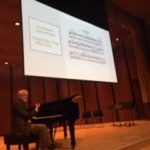
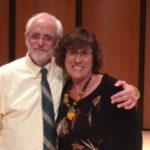
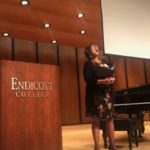 So, I believe that, as a teacher, I have to keep learning and growing in order to give you the best I can. Dr. William Westney was the Guest Speaker this past Friday and Saturday at a Quad State Music Teachers Conference that I chaired and attended. It took place at Endicott College in Beverly. Over 100 teachers and college students were in attendance! I think you’ll be able to tell what new things I took away from that day of learning and growth!
So, I believe that, as a teacher, I have to keep learning and growing in order to give you the best I can. Dr. William Westney was the Guest Speaker this past Friday and Saturday at a Quad State Music Teachers Conference that I chaired and attended. It took place at Endicott College in Beverly. Over 100 teachers and college students were in attendance! I think you’ll be able to tell what new things I took away from that day of learning and growth!
Creative Practicing Blog – Session 1, week 4, September 28, 2019
 I’m excited about SCALE PRACTICE YOUR WAY:
I’m excited about SCALE PRACTICE YOUR WAY:
- Pick your scale
- Fill in the notes and fingering
- Assign yourself a unique and exciting way to practice it all week long! Let’s see how many ways you all can come up with!
Reminder:
Please sign up for Group Class for the week of October 14 (Columbus Day Week)
The choices are available on the Calendar section of this website!
Creative Practicing Blog – Session 1, week 3, September 21, 2019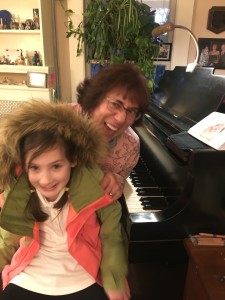
My viewpoint as a teacher is a bit different from your viewpoint as a student, as you can imagine! I’m happy to have FUN, I’m happy to feel relaxed, I’m happy to listen (within reason) to how your week has gone and why your practicing was as good (or as bad) as it was. But, what I want MOST OF ALL is to help you move forward, to make sure you grow and thrive as a pianist and musician and to truly UNDERSTAND how to practice and how to make progress. For these things to happen, I need your help!
Please be prepared for your lesson in the following ways:
Please have all materials.
Please read the blog before your lesson and be ready to discuss it.
Please fill in your practice days/times on your practice chart.
Please practice what is on the assignment sheet inn the most thorough and complete way you can.
Please try to solve your own practice problems/questions, whenever possible.
And last, no matter how hard your day has been or how tired you may feel, bring your BEST self to your lesson! It’s the only time we have together all week long!
Thank you!
Creative Practicing Blog – Session 1, week 2, September 14, 2019
Hit the ground running!!!!!!
Great, you’re reading the Blog! Have you practiced and filled in your chart? Have you filled in your contribution to the bulletin board?
_________________YES _____________NO __________MAYBE
The habits you establish at the beginning of the year tend to carry you through the year! What can you do to develop the best piano habits NOW?
Creative Practicing Blog – Session 1, week 1, September 7, 2019
Our Theme for the Year:
Find Your Best Expression!
Please think about the question for the bulletin board!
There’s nothing more exciting than the feeling of school or LESSONS starting up again – seeing each other again, a chance to establish good habits and towork hard, even while remembering summer fun! We have several new things going on at Alison S. Barr Music Associates:
Activity and Listening Center starting Week 2! Listen while you wait for your lesson to start, practice a musical skill or just read a good book.
Daily Practice Chart This might sound really BORING, but you will be fascinated when you see what your practice times really look like on paper. I’ll introduce this at your first lesson!
MyMusicStaff Scheduling Software This might be more important for your parents, but it will help everyone keep lesson attendance regular!
Music for Good We’ll continue to find ways to offer our music to brighten and help people around us in our greater community!
Creative Practicing Blog – Session 3, week 8, May 5, 2019
For the High School Master Class on May 18?
For the Spring Recital? Friday, June 7?
Creative Practicing Blog – Session 3, week 7, April 21, 2019
What music did you hear or listen to over vacation? I was in Spain and France, but every place seemed to be playing American pop music. Funny. Think about some places you have been and what kind of exotic or different music you heard. How does it compare to the music you have been playing on piano?
Creative Practicing Blog – Session 3, week 6, April 7, 2019
Hope you can attend!
Just a reminder — Students and families can purchase tickets from the “discounted” category at:
Have a great vacation!
Creative Practicing Blog – Session 3, week 45, March 31, 2019
Wow, times have certainly changed since I started teaching 44 years ago!!!! I think we do a pretty good job using technology to help us in the studio. We listen to videos of our pieces, we put metronome apps on our phones and set our phone alarms to remind us to practice. We have a studio website (alisonbarr.com) and a FB page (Alison S. Barr Music Associates) What else can we do to be really CREATIVE and INNOVATIVE about using technology? Let’s start a list that we can share with everyone!
Creative Practicing Blog – Session 3, week 4, March 24, 2019
How do emotions come into the music you are playing on the piano? Can you think of a piece that is full of emotion? Is it just one emotion or a mixture? Have you ever tried to “map” or identify the emotions in a piece? This might help you play the piece with more connection, more depth! Try it and see how your music changes.
Creative Practicing Blog – Session 3, week 3, March 17, 2019
How creative is your practicing? Think of your practice time as an experiment – an experiment in how to play things more securely, with deeper understanding, more smoothly. How many ways can you look at your piece or some part of it? How many different things can you do with a section, a phrase or a melody? The more you shake things up, the better you’ll know them. What are some ways YOU can work in your very own practice lab?
Creative Practicing Blog – Session 3, week 2, March 11, 2019

Ask me about the exciting contest going on at the studio!
Creative Practicing Blog – Session 3, week 1, March 3, 2019
 Practicing can teach us a lot about ourselves! We are alone in a room with just the piano for company. We have control of everything that happens, unless someone comes in and interrupts us. So who are you? Are you a tortoise or a hare? Are you someone who has short bursts of focus or do you get “lost” in your work? Are you easily distracted? Are you creative with your practicing, varying your routine and keeping it fresh? Are you a perfectionist or is “just ok” all right with you, so you are able to cover more ground? Do you move quickly from piece to piece or get caught up in one piece? Let’s identify some of your BEST practice qualities and also a few that you may need to work on so you can be your BEST SELF and live your BEST practice life!
Practicing can teach us a lot about ourselves! We are alone in a room with just the piano for company. We have control of everything that happens, unless someone comes in and interrupts us. So who are you? Are you a tortoise or a hare? Are you someone who has short bursts of focus or do you get “lost” in your work? Are you easily distracted? Are you creative with your practicing, varying your routine and keeping it fresh? Are you a perfectionist or is “just ok” all right with you, so you are able to cover more ground? Do you move quickly from piece to piece or get caught up in one piece? Let’s identify some of your BEST practice qualities and also a few that you may need to work on so you can be your BEST SELF and live your BEST practice life!
Creative Practicing Blog – Session 2, week 12, February 24, 2019
This week, lets talk a little about what the BASICS of piano playing may mean to you!
Can you list them? How could we add these back into your daily practice?
BACK to BASICS!
Creative Practicing Blog – Session 2, week 11, February 10, 2019
Remember when I went to Beirut, Lebanon, to teach this past summer? It was a life-changing experience. I was teaching in this place in the Middle East that has experienced lots of conflict and strife. But, in the end, I found that the children I taught were just like all of you. They loved music, wanted to grow and learn and also wanted to be on their phones and with their friends! Now, I am planning a very exciting Friends of American Voices Benefit Concert for the organization that sponsored my Beirut YES Academy. I hope you ALL can attend this concert and be part of the “Making Music – Making Peace” theme.
Save the date:
Saturday, May 4, 2019 at 1:00 p.m. House of Prayer Church in Hingham
Music is truly the Universal Language!
Creative Practicing Blog – Session 2, week 10, February 2, 2019
How do we figure out when we have worked on a piece for long enough and that it is good enough? Tricky business. Each piece is different. Even pieces we play fairly well can benefit from a “second run,” where we might put them away for a month or so and bring them back with renewed energy and new technical skills. Some pieces we LOVE, some not so much. The “not so much” can certainly be put away before they are polished and mastered. Pieces for performance require a higher level of mastery – almost so we can play them every which way, inside out and standing on our head. We want to know them better than we think is possible. Most pieces are somewhere in the middle: we learn them fairly well and they help us grow both technical and musically. Polishing them is not always necessary to get the “learning” out of them
Think about the different pieces you’ve studied lately. Where does each one fall on the spectrum of “good, better, best?” Would you like to leave some and perfect others? Let’s talk about it!
Creative Practicing Blog – Session 2, weeks 8/9, January 27, 2019
Why do we put effort into things? For a grade? For a winning score? Are there other reasons? Learning piano in our studio doesn’t come with a grade, so why get good at it?
Are there things that human beings accomplish that aren’t measured by a grade. You are so much more than the grades you get in school, than the tests you take, than the scores you get at sports. Being a musician comes with a lot of “hidden” benefits. Can you name a few?
I once had a student whose Dad asked me to give her a grade for every lesson. I tried for a few lessons, then I told him I couldn’t do it. But she continued to grow as a pianist, even without a grade!!!! Some things are better than an “A!”
Creative Practicing Blog – Session 2, week 7, January 13, 2019
Thanks so much, Diana, for helping launch the New Year’s Piano Resolutions Snowman. He looks so great, but he needs even more resolutions, so please add yours if you haven’t already. Our recital is coming up this Friday, January 18th at the James Library at 7:00 p.m. I’m so excited to hear all your music, and I hope you are, too!
Creative Practicing Blog – Session 2, weeks 5/6, January 6, 2019
It is now 2019! A new year! And we have a new friend in the studio – our Snowman – who is ready to display your New Year’s Piano Resolutions for everyone to see. Please think about two or three resolutions and be ready to write them down on the special shaped paper (thank you, Diana Won!) in the studio. Then, start working on your resolutions.
Examples: In 2019, I’m going to pay better attention to fingering.
In 2019, I’m going to make sure my scales are well-prepared with good hand position, correct fingering and correct notes!
In 2019, I’m going to increase my practice time and practice regularly every day that I possibly can.
Creative Practicing Blog – Session 2, week 4, December 16, 2018
Everyone needs a break now and then – from the routine and stress of our everyday schedules! What are some ways you can use your vacation time to de-stress at the piano? Obviously, regular practicing of your assign ment and recital piece is important and great to do when you have the time that vacation offers. But you can also enjoy the instrument in other ways – play for friends and family, sight-read, play holiday music, compose, improvise and review old pieces! So many ways to enjoy the fact that you know how to play the piano! What do YOU plan to do at the piano over vacation?
ment and recital piece is important and great to do when you have the time that vacation offers. But you can also enjoy the instrument in other ways – play for friends and family, sight-read, play holiday music, compose, improvise and review old pieces! So many ways to enjoy the fact that you know how to play the piano! What do YOU plan to do at the piano over vacation?
Creative Practicing Blog – Session 2, week 3, December 9, 2018
Many of you have already participated in “Music for Good” by playing in the Playathon and/or Coffeehouse. Your individual posters will be out soon. If you haven’t already completed this studio requirement, the holiday season is a SUPER time to do so! SKYPE your grandparents who may not be able to get to a concert and play for them, set up a keyboard for your neighbor who may not get out much. Visit an assisted living where someone you know might live and play them some holiday or other songs. A little bit of music played around this time goes a LONG way. Every year, my husband and I go to the Alzheimer’s Care Facility where my sister works and we play tuba and piano duets. Sometimes my sister joins in on trumpet. So much fun and SO well worth it! Please think about what you can do and let me know when you do it so I can make you up a poster!
Special kudos to Micah Mulder, who not only played in the Playathon, but also accompanied his chorus and played at his church fair! More coming soon on the home page!
Creative Practicing Blog – Session 2, week 2, December 2, 2018
Later today, I’m driving out to UMass Amherst to attend the Senior Recital of my young friend and honorary niece, Annierose Reed Klingbeil. Annierose is majoring in Music Education and is studying both violin and piano at a high level. I’m often asked if I have any “really serious students” who go into music as a profession – either teaching or performing. Yes, of course, I have had a few of those. I have several former students who operate piano teaching studios and a few who are music teachers in schools. Mostly, my students do not go into music as a profession. But many, many, tell me that they continue to play, go to concerts, improve, share music with those around them and LOVE the fact that they learned to play the piano. So, if you stick with it and get to a pretty good level of accomplishment, you will have piano in your life forever! How do you see YOUR lifelong relationship with music?
Creative Practicing Blog – Session 2, week 1, November 25, 2018
It’s time to finalize our choice for Winter Recital pieces! The date is Friday, January 18, 2019. So, even though there seems to be a lot of time, it’ll creep up really quickly and our goal this year is to be super well-prepared. What are some things we might want to look for in a recital piece?
What choice do you think is best for you?
 Creative Practicing Blog – Session 1, week 12, November 18, 2018
Creative Practicing Blog – Session 1, week 12, November 18, 2018
We’ve already started work on our “Composition Book 2019” by improvising with a purpose. As you work on each weekly improv prompt, notice and perhaps even write down musical ideas you REALLY like. Beethoven, among many other composers, kept a sketchbook of ideas that might later become compositions. Who knows what might become the inspiration for YOUR composition?
Creative Practicing Blog – Session 1, week 11, November 11, 2018
2018-2019 MUSIC for GOOD STUDIO PROJECT!
Music is a powerful force for good. People who hear music, especially those who may not have a lot of opportunity to hear live music, are given a chance to hum along, move a little, think of happy times they may have had and enjoy being with others who are listening. Also, your music can benefit a good cause, as in the Thanksgiving Playathon and December Coffeehouse that both raise funds for homelessness. As a pianist, YOU have the power to offer your music to someone who would benefit from it. This year, everyone in the studio will participate in an outside concert – either one I arrange or one you arrange yourself! Start thinking about where and when you might like to play. Once you’ve completed the project, you’ll get a nice poster with your photo on it!
Creative Practicing Blog – Session 1, week 10, November 4, 2018
This weekend, I’ve been practicing a LOT. I have a flute lesson coming up and my music is very difficult. I’m working on making everything sound beautiful and smooth. I am working on a Bach Sonata that has four movements and is very long. I’m also working on piano music – a Mozart Four-Hands Sonata and also a Mozart Fugue for four-hands, to play with a student of mine who comes from Manhattan for a lesson once every couple of months. All the Mozart is difficult and needs to be played with precision.  Also, some of the music is very fast. Even though I’ve been a musician for a LONG time, my challenges with practicing are the same as YOURS: keeping my focus, not checking my phone, staying longer than I really want to on some parts, finding creative and new ways to work things out, dealing with sounds that aren’t too great and being happy with very small rewards. I know that it’s hard work, but my music is beginning to gel and I’m feeling very eager to get back to it now. The more you do it, the better you get! Stick with it every day, until you feel the rewards!
Also, some of the music is very fast. Even though I’ve been a musician for a LONG time, my challenges with practicing are the same as YOURS: keeping my focus, not checking my phone, staying longer than I really want to on some parts, finding creative and new ways to work things out, dealing with sounds that aren’t too great and being happy with very small rewards. I know that it’s hard work, but my music is beginning to gel and I’m feeling very eager to get back to it now. The more you do it, the better you get! Stick with it every day, until you feel the rewards!
Creative Practicing Blog – Session 1, week 9, October 28, 2018
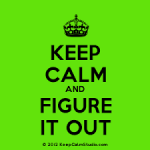 As many of you know, my most disliked answer to any question is “I don’t know.” or “I don’t have a clue.” Why do I dislike that answer so much? Because, in reality, we can usually figure out SOMETHING about the answer. We can at least find a starting point from something we already know, from CONTEXT (see last week’s blog) or from an experience we’ve had with another piece. Sometimes, all it takes is an extra moment of study, thinking, reflection and experimentation to come up with the beginning of an answer. Once you have that, you can go from there. From now on, let’s try to reserve “I don’t know.” for something we truly have NO way of figuring out – and the chances of that happening are pretty rare!!!!!!
As many of you know, my most disliked answer to any question is “I don’t know.” or “I don’t have a clue.” Why do I dislike that answer so much? Because, in reality, we can usually figure out SOMETHING about the answer. We can at least find a starting point from something we already know, from CONTEXT (see last week’s blog) or from an experience we’ve had with another piece. Sometimes, all it takes is an extra moment of study, thinking, reflection and experimentation to come up with the beginning of an answer. Once you have that, you can go from there. From now on, let’s try to reserve “I don’t know.” for something we truly have NO way of figuring out – and the chances of that happening are pretty rare!!!!!!
Creative Practicing Blog – Session 1, week 8, October 21, 2018
When you play a piece, there’s a lot more to know about that piece than just the notes on the page. The more CONTEXT you can gather, the better.
When was the piece written? What was the composer’s style and background? What is the mood of the piece?
For next week, research these things for one of your pieces. Write down what you’ve found out and we’ll talk about it!
Creative Practicing Blog – Session 1, weeks 6/7, October 14, 2018
In his week’s lesson, we’ll create our very own world for the bulletin board!
Please include: where your piece is from, your name and the name of your piece or pieces…
Creative Practicing Blog – Session 1, week 5, September 30, 2018
We are going to continue with “Happy Birthday” by creating our own arrangement. When we arrange something, we take the original make a new version, like the person who took individual flowers and made them into this PUP arrangement. For example, your arrangement can be in a different style – like jazz or pop. I’ll play some arrangements of “Happy Birthday” for you – this will lead you to your own ideas. You’ll have a couple of weeks to come up with your arrangement! Remember to be as creative as possible!
Creative Practicing Blog – Session 1, week 4, September 24, 2018
What does it mean to “play by ear?” How do we practice listening to our notes – whether individual ones we want to hear while playing by ear, or combinations of notes while we practice our pieces?
Let’s list some skills that will help us be better listeners!
Creative Practicing Blog – Session 1, week 3, September 17, 2018
You know, in the “olden days,” when most things functioned mechanically with all the different moving parts, people learned to fix things by taking them apart and putting them back together. So, as they looked at all the different parts, they saw how they worked and how they related to one another. This is EXACTLY what we need to figure out as we practice — study and practice all the various parts of the piece, figure out how they relate, perfect and polish them and also put them back together to make a complete whole that WORKS! For homework this week, look at a piece from your assignments and find examples of how you can do this. Be ready to talk about your example at your next lesson!
Fun Events Coming UP: Saturday, Nov. 17 Thanksgiving Playathon
Saturday, December 1 Coffeehouse at First Parish Scituate
Creative Practicing Blog – Session 1, week 2, September 10, 2018
There is so much excitement when we start a new school year. New books, new clothes, new friends, new teachers! (Except in piano, you might have the same old teacher every year, haha!) So what are some things YOU can do to be sure you launch yourself with lots of energy and enthusiasm into the new piano year? Some things are more obvious than others, but a good way to get started is to look at the “How to Have A Great Year at Piano” sheet I handed out at the first lesson!. Can’t wait to see what your responses are – please jot them down so you’ll remember them. Mrs. Barr
Creative Practicing Blog – Session 3, week 10, May 6, 2018
 Our Spring Recitals take place on Friday, June 8! So just a few practice weeks
Our Spring Recitals take place on Friday, June 8! So just a few practice weeks
left to go. Do you have the notes and rhythms accurately and securely learned? Are you able to play at or near performance tempo? Do you have the expression and interpretation clear in your mind – what dynamics, what phrasings, what you want people to hear and understand about your piece? This would be a good time to take stock and recommit yourself to a great performance!
Creative Practicing Blog – Session 3, week 9, April 29, 2018
This week we’ll do a rhythm basics review and analyze your “four difficult measures.” For next week, the assignment is to to write four measures of rhythm in a time signature of your choice. Make it as simple or complicated as you like – you can even try to stump me! But, remember, you have to make sure that you have written notes that add up to the correct number of beats per measure in your time signature! Have fun!
Creative Practicing Blog – Session 3, weeks 7 and 8, April 22, 2018
 There is nothing easy about COUNTING! Even the most advanced musicians sometimes have to stop and figure out a tough rhythm We’re going to start working on rhythm-reading and writing this week! To begin, please go through your music and find an example of four measures that you think are TOUGH TO COUNT. Do the best you can at figuring out how to tap or clap each hand separately, and we’ll finish up at your next lesson! (You don’t have to play the example on the piano, but you can if you want.) This is going to be so much fun and so important to your overall sight-reading, so work hard at it!
There is nothing easy about COUNTING! Even the most advanced musicians sometimes have to stop and figure out a tough rhythm We’re going to start working on rhythm-reading and writing this week! To begin, please go through your music and find an example of four measures that you think are TOUGH TO COUNT. Do the best you can at figuring out how to tap or clap each hand separately, and we’ll finish up at your next lesson! (You don’t have to play the example on the piano, but you can if you want.) This is going to be so much fun and so important to your overall sight-reading, so work hard at it!
Creative Practicing Blog – Session 3, week 6, April 8, 2018
You’ve all heard me say many times that mastering a piece is like building a pyramid. On first glance, we might think the bottom is the most difficult to build, because it is so incredibly wide. And, if we compare the bottom of the pyramid with all the work we put into learning our notes, correct rhythms, fingerings and maintaining a steady tempo, that honestly IS a lot of work. However, think about what it must have been like to add the very highest blocks to the pyramid, especially when the workers had to do it before engine-powered machines were available!
For us, putting the finishing touches on our piece can require the most time, energy, skill and patience. An example would be getting our piece to exactly the tempo we want and being able to play it with flow and smoothness. Or, putting in dynamic shaping which includes each note of every phrase – both hands! Or, listening for the right balance of weight between the melody and accompaniment and planning how that might change in various parts of the piece. Think of what those “final blocks” are in your piece. The sooner you start to work on them, the easier it will be to complete the entire pyramid in time for our recital!
Creative Practicing Blog – Session 3, week 5, April 1, 2018
There are SO many d emands on all of you and on the little “open” time you have, after school, sports, and homework. The piano is certainly an important priority and you probably enjoy it once you get there, but it might be hard to make an appointment with yourself to practice. There is no team depending on you to show up at a scheduled practice time and there is no grade that you will fail to pass if you don’t do it.
emands on all of you and on the little “open” time you have, after school, sports, and homework. The piano is certainly an important priority and you probably enjoy it once you get there, but it might be hard to make an appointment with yourself to practice. There is no team depending on you to show up at a scheduled practice time and there is no grade that you will fail to pass if you don’t do it.
What are some ways you can make sure that you get to the piano every day? Is that time you spend alone at the piano with your music a priority to you? Why or why not? How can you place it as a higher priority? And, if it were a higher priority, how might you benefit?
Creative Practicing Blog – Session 3, weeks 4 & 5, March 25, 2018
Our Improvaganzas will have a “Music for Good” component! Audience members may contribute a free-will offering which will go to two charities:
April 6 – Wolf Conservation Center
Promoting wolf conservation since 1999
April 27 – NPH USA
NPH USA transforms the lives of vulnerable children in
Latin America and the Caribbean with homes, healthcare and educational programs
If you have a favorite charity to which you and your family would prefer to contribute, please let me know. And, remember, you can always schedule your own small recital as a benefit or to entertain audience members who might not otherwise have a lot of music in their lives!
Music for Good!
Creative Practicing Blog – Session 3, week 2, March 11, 2018
 What music do you listen to? I know many of you have wide and varied listening taste. For the next couple of weeks, take note of what you listen to – maybe even write it down! We’ll discuss it at your next lesson and I’ll report back to you about what I listened to at my Music Teachers National Association Conference in Orlando. Have a good couple of weeks – musically and in every other way!
What music do you listen to? I know many of you have wide and varied listening taste. For the next couple of weeks, take note of what you listen to – maybe even write it down! We’ll discuss it at your next lesson and I’ll report back to you about what I listened to at my Music Teachers National Association Conference in Orlando. Have a good couple of weeks – musically and in every other way!
There are no lessons on Monday, March 19 – Wednesday, March 21. I will teach on Thursday, March 22.
Creative Practicing Blog – Session 3, Week 1, March 4, 2018
Sometimes we forget that an actual PERSON created our piece. This person likely had a very interesting and possibly tumultuous life. As you learn your recital piece, please take time to look up your composer and jot down in a few facts about his/her life. We can discuss them! This will help you be motivated to do your best work learning your piece, because, after all, COMPOSERS are people, too!
Creative Practicing Blog – Session 2, Week 12, February 25, 2018
What’s in a recital piece? It should be challenging, show your best skills and offer learning opportunities, just like a new book you read in school. One more thing, perhaps the most important – you should be in LOVE with it. You should love the sound and really, really want to work hard to learn it. As we select your piece for the Spring Recital on June 8 (High School Students – Master Class on May 19th,) keep in mind how much time you will be spending with it and how well you will need to know it to perform it successfully. Think of it as your “best friend,” someone you enjoy very much and always want to know more about!
 Creative Practicing Blog – Session 2, Week 11, February 11, 2018
Creative Practicing Blog – Session 2, Week 11, February 11, 2018
Some of you might be enjoying a beach like this during your upcoming vacation, but some of you might be hanging around the house looking for meaningful ways to spend your time! If you are part of the latter group, What are some tips to keep your vacation practicing fresh and fun?
Here’s a start – go through all your old books and find some favorite pieces from your past. Make a little “program” of them and play them for your family at the end of vacay. I know you can think of other ideas to keep yourself going – be ready to let me know how it went when we come back to lessons!
Creative Practicing Blog – Session 2, Week 10, January 28, 2018
The dates for our Improvaganzas will soon be announced! In the meantime, how can you expand and improve your improvising? Always remember to shake things up – change speeds, change registers, add the other hand, use a thicker or thinner texture, change dynamics. Anything you can think of that expands the structure of your improv is a good idea. Don’t be afraid to take risks and play things outside your normal path. That will keep your attention and also engage the audience!
Creative Practicing Blog – Session 2, Week 9, January 21, 2018

As you know, one of my favorite sayings is “Scales are people, too!” Well, whether you believe that or not, you know that, as a pianist, scales are a MOST important part of your technical routine. Did you know that the original root for our word “scales” is from the Latin “scalare” meaning stairs or steps. Daily scale practice helps us with many things – knowing our key signatures, learning the correct finger pattern in each key, exercising and strengthening our fingers, helping our thumb get better at crossing under, developing even sound from one finger to another, and many others. (Name a few more!) Please pay special attention this week to your scale practice and keep in mind that as you practice your scales, you are climbing steps to the heights of piano mastery!
There are no lessons the week of January 15! I’ll be running my Midwinter Adult Piano Retreat in Florida. How do we keep ourselves practicing well between lessons? Here are some ideas:
Set a goal of getting to the piano every day, even if it’s for a short period of time.
Start with an improv or piece you really LOVE, so you’ll be more likely to stay at the piano.
Do new note-learning with energy and motivation – this is when you’re forming a “first impression” of the piece, so make it a good one!
Keep playing your recital piece – don’t let it “slip away!”
On the day that you would normally have your lesson, set some new goals for the following week, so you won’t get “stale!”
Have fun and see you the week of January 22. Please be ready to report what you did to keep yourself motivated!
Mrs. Barr
Creative Practicing Blog – Session 2, Week 6, January 7, 2018

We can always resolve to be better, work harder, practice more, but how do we really accomplish change? For example, next week, there are no piano lessons (the week of Jan. 16.) The recital will be over and we might need extra motivation for our practicing.
Let’s make a goal in each of the following areas:
- Improvisation/Creative Work
- Technique – Scales
- Repertoire – a New Piece?
- Sight-reading
- Other?
At your next lesson, the week of Jan. 23, we’ll have a new projects in collaborative piano AND more prep work on Improvaganza! Have a great couple of practice weeks!
Creative Practicing Blog – Session 2, Week 4, December 16, 2017

Since we practice by ourselves, we have to be very good at giving ourselves feedback. What’s going well? What’s going not so well? In today’s lesson, we’ll discuss how your recital or any other piece is going and what you did over the last week to make it better.
ALSO: During the first and second weeks of January, before our Jan. 12 recital, we’ll be holding Group Classes to practice performing. There, you’ll be able to give positive feedback on each other’s pieces! This is a great opportunity to perform in an informal setting.
Lessons begin again on January 2, 2018! Happy New Year!
Creative Practicing Blog – Session 2, Week 2, December 9, 2017
As our January 12 Winter Recital approaches, I’d like to discuss the benefits of two different types of practicing: 1) when we play through our piece from beginning to end, maybe correcting mistakes, but not stopping to determine why the mistake happened, instead \going for the overall flow of the entire piece; OR 2) the “micro-managing” type of practice, where we work deeply and slowly on a small section, perhaps taking hands apart, finding creative ways to play, study and analyze what is happening in that section. Which is better? (That may be a trick question!) How do you know when to use each type? As the recital draws closer, does the percentage of one type or the other change?
Creative Practicing Blog – Session 2, Week 1, December 2, 2017
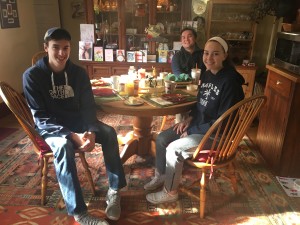 I’d like to thank Jack Rowland, Diana Flynn and Michael Porter, all seniors, for agreeing to serve on the very first “Student Advisory Council.” I’m excited that we’re going to meet and brainstorm ideas for the “Music for Good” project. Even without a lot of scheduling difficulty, you might be able to find a simple and satisfying way to share your music with someone over the holidays. This could be a grandparent, neighbor, friend or other family member. It would be great if everyone could think of one person and try to arrange this! Let me know who your special person will be and when you think this might take place, and, keep practicing your holiday and other music!
I’d like to thank Jack Rowland, Diana Flynn and Michael Porter, all seniors, for agreeing to serve on the very first “Student Advisory Council.” I’m excited that we’re going to meet and brainstorm ideas for the “Music for Good” project. Even without a lot of scheduling difficulty, you might be able to find a simple and satisfying way to share your music with someone over the holidays. This could be a grandparent, neighbor, friend or other family member. It would be great if everyone could think of one person and try to arrange this! Let me know who your special person will be and when you think this might take place, and, keep practicing your holiday and other music!
Creative Practicing Blog – Session 1, Week 11, November 12, 2017
Happy Thanksgiving and remember to figure out your Holiday or Other Song by ear!
Creative Practicing Blog – Session 1, Week 10, November 5, 2017
Sometimes when you practice, you’re just playing though the whole piece to see how it holds together or what you can do to make it better. But more often than not, you are focusing on a specific goal – to get the rhythm even, to decide what kind of dynamics to use, or to work on fingering. Whatever that goal may be, you can use a creative method to accomplish it – – try playing a difficult part up one octave with your newly worked-out fingering. Try playing a phrase faster or slower than it would normally go, or even louder or softer. The more exciting you can make your practicing, the more you are likely to stick with it. Try some creative practice strategies this week and let me know how they work!
Creative Practicing Blog – Session 1, Week 9, October 29, 2017
 This week, I want to ask you to think about all the elements that go into a piece of music — the pitches, the rhythm, the texture (and for piano, the harmonies, the dynamics, the expression and tempo markings, the duration and silences, the structure and the timbre. Take one of your pieces and look at each of these elements for next week- we’ll discuss your observations!
This week, I want to ask you to think about all the elements that go into a piece of music — the pitches, the rhythm, the texture (and for piano, the harmonies, the dynamics, the expression and tempo markings, the duration and silences, the structure and the timbre. Take one of your pieces and look at each of these elements for next week- we’ll discuss your observations!
Creative Practicing Blog – Session 1, Week 8, October 22, 2017
Think for a moment about how the compositions you play get started – from a creative spark of some kind. It may be as simple as a sound from nature or something mechanical, like the rhythm of whirring gears. It may be something from an already-composed piece, like a chord, a rhythmic pattern or a few notes of melody. Or, it may be something abstract that provides inspiration — like a feeling, a picture, a place, an animal or a person.
Assignment: Please think about something that might inspire YOU to improvise or compose. Then write a description of it or write its notes on your assignment sheet for next week. We’ll start talking about how we can use it for improv!
Creative Practicing Blog – Session 1, Weeks 6 & 7, October 15, 2017
Did you know that when you improvise, you are participating in a very long and important tradition of creation? For hundreds of years, classical composers were expected to improvise at a very high level, ON the SPOT in front of an audience! I won’t expect that, but we all, me included, are going to be applying improv to everything we play for a while – our scales, our pieces for practice purposes, our technical exercises, and, of course, to our actual improvs. I’m excited coming from a very special conference I attended, and I think you’ll all find it really meaningful and FUN!
And, by the way, how many other words can you make from the letters in
IMPROVISATION?
Creative Practicing Blog – Session 1, Week 4, Sept. 28, 2017
What does the word “interpretation” mean? And what does it mean as it relates to music?
Can you describe YOUR interpretation of the picture above? What makes your interpretation unique? Can you apply that uniqueness to a piece of music you’ve been assigned? Please select one of your pieces and we’ll work on “interpretation” in your upcoming lesson! (Hint – Dynamic variety may be a part of your interpretation!)
Creative Practicing Blog – Session 1, Week 3, Sept. 21, 2017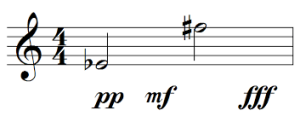
We’ve learned that Cristofori’s piano, called “Gravi cembalo col piano e forte” (Which means what?) could play with a wider dynamic range than any keyboard instrument of its time, except for maybe a pipe organ. What do you think this meant for the people who played it? How did it change the way they played their music? What does that mean for us today? How much do you feel you vary your own dynamics? 
Study the chart above and see how many of these you can use in your practicing this week!
Creative Practicing Blog – Session 1, Week 2 – Sept. 14, 2017
All of you have had wonderful first lessons of the year! I want to commend you on the thoughtful answers you gave to last week’s blog question. Many of you commented on the fact that the piano is “real” or “non-electronic.” Some went on to say that the connection between the pianist and the instrument is immediate and personal. I want to ask you to take this thought one step further, looking at the inner workings of the original piano, invented by Bartolomeo Cristofori in 1709.
It’s fairly simple (notice that the the key is on the right,) but it was extremely innovative for the time. What earlier instrument(s) do you think this piano was influenced by? And what was so innovative about this particular action? Do you think keyboard instruments before this one had hammers? If so, what was different about this invention? What made it such a sensation when people first played on it? You can check out this link to find out more!
http://www.metmuseum.org/art/collection/search/501788

Creative Practicing Blog – First of the New Piano Year! Session 1 – Week 1 Sep. 7, 201

I can already feel it. This is going to be an amazing piano year! I hope you’ve all had a relaxing and exciting summer and please send me any photos you may have of places you visited.
We have two small projects to start off our year! (Due at your second lesson!)
1) Improvise a short piece based on something you remember from your summer
2) Fill in your “What I Love About the Piano….” for our “Keys and Me” bulletin board
And here’s your first “food-for-thought” question: What is it about the sound of the piano that causes people to be so drawn to it? What does it have that a keyboard doesn’t? Please be ready to respond at the beginning of your second lesson. Thanks! Mrs. Barr
****************************************************************************************************
Last Creative Practicing Blog of the Year! Session 3 – Weeks 11/12

A beautiful long summer stretches before you! You’ll have camps, vacations, nice times with family and friends and some extra time (possibly!) for summer piano. This last week of classes (Monday’s last day is next week, June 12,) we’ll write down some summer goals, whether or not you are taking lessons. Remember that, just like you wouldn’t leave your good friend alone in a room all summer, you don’t want to forget about your piano! You can sightread, learn a popular piece, review an old piece or learn something you’ve always wanted to learn. I’ll help you get started! Let’s talk about some summer goals together. And, above all -have a great summer!
Creative Practicing Blog Session 3 – Week 10 – Creative Practicing Blog – May 20, 2017
 Group Classes are coming up next week! We’ll practice performing for each other. What do you think are the most important skills involved in performing? What are the benefits of performing? What are good things to think about before and during performances? How do you feel when you’ve had a good performance? What can help you have your best performance?
Group Classes are coming up next week! We’ll practice performing for each other. What do you think are the most important skills involved in performing? What are the benefits of performing? What are good things to think about before and during performances? How do you feel when you’ve had a good performance? What can help you have your best performance?
Session 3 – Week 9 – Creative Practicing Blog – May 13, 2017 What is “flow?” It’s sometimes called being “in the zone.” This is the feeling we get when we are completely involved in an activity, completely invested in what we are doing with no distractions disturbing our thoughts. You may have felt this while playing a sport, reading a great book or being at a favorite spot with a friend. When we play the piano, we can experience this sensation. In fact, because the piano engages our mind, body and spirit, all at once, it is a perfect way to achieve the flow sensation! You actually may become “lost” in the music. What contributes to this feeling of flow? How can we achieve it in our playing and in our recital piece? Can you remember a time at the piano when you lost track of time? Think about how to achieve flow whenever you practice or perform!
What is “flow?” It’s sometimes called being “in the zone.” This is the feeling we get when we are completely involved in an activity, completely invested in what we are doing with no distractions disturbing our thoughts. You may have felt this while playing a sport, reading a great book or being at a favorite spot with a friend. When we play the piano, we can experience this sensation. In fact, because the piano engages our mind, body and spirit, all at once, it is a perfect way to achieve the flow sensation! You actually may become “lost” in the music. What contributes to this feeling of flow? How can we achieve it in our playing and in our recital piece? Can you remember a time at the piano when you lost track of time? Think about how to achieve flow whenever you practice or perform!
Session 3 – Week 8 – Creative Practicing Blog – May 6, 2017

May and June are months when lots of academic pressures mount. AP exams, finals, grades that count towards your GPA. Even for younger students, it can feel like a pressure cooker! My advice is, BREAK that study pressure with a lovely interlude of piano playing. Short practice sessions help a lot, especially if you don’t have long time blocks available. You will find that you can enhance and perhaps REDUCE the time you spend studying — being at the piano can clear your brain and rejuvenate you when you go back to hit the books! Think of FIVE things you can do in just 10 or 15 minutes to improve your piece? And, if you’re tired at the end of a long evening, take a few minutes to chill out at the piano!
Session 3 – Week 7 – Creative Practicing Blog – April 28, 2017

What is the tempo of your recital piece? Is your current speed coming close to that tempo? Our pieces sound JUST RIGHT when they are close to the speed the composer intended. What are some ways you can help yourself play your piece at the proper tempo? Have you ever experimented with just a small part of the piece? How does it feel and sound when you play “up to tempo?” Think of some practice strategies you can use to get your piece faster or to solidify it at the tempo of your choice? It’s not too early to begin thinking about the “performance tempo” of your June 9th recital piece!
Session 3 – Week 6 – Creative Practicing Blog, April 21, 2017
Just a reminder to check out Alison S. Barr Music Associates on Facebook! Every week, I’ll feature a few students for “All in a Day’s Work,” a slideshow of photos taken during lessons and music played by current and former students.
Summer is closer than we think and with it comes a golden opportunity to expand our horizons, try new things and improve on what we already have learned. Our piano skills are no exception! Perhaps you are busy at camp, away at a summer home or just looking for more free time — you can still schedule in a couple of lessons and especially try to do some  fun playing while you are near a piano. Sight-reading, playing with a friend, improvising, learning a few popular pieces – these are all things I can set you up with or without lessons.
fun playing while you are near a piano. Sight-reading, playing with a friend, improvising, learning a few popular pieces – these are all things I can set you up with or without lessons.
What are some ways YOU can keep piano alive during the long 12 weeks of summer?
P.s. Don’t take this photo literally! No need to drag your piano into the water!
Session 3 – Week 5 – Creative Practicing Blog, April 8, 2017
Have you ever dreamed of finding a buried treasure? When I was a kid, I had a little treasure chest like the one below. My brother, sister and I used to put little trinkets in it and bury it in various places around our back yard. (It was a different time, no computers, etc., so we were looking for exciting things to do to entertain ourselves.) I guess we thought we would have the patience to keep it buried for years and then we would unearth it and be surprised at all the riches! Unfortunately, we never could wait more than a couple days to see if it was still there.
 We’re starting our very own “treasure chest” project at the studio – Repertoire Rich. Here’s how it works: As soon as you have completed your Memory Project piece, I’ll give you a sheet to record all the new pieces you play in ONE MONTH. You can play pieces at a reasonable level in your old books or complete pieces you have started but never finished. The pieces do NOT have to be at performance level to be placed on the list. We will decide together whether a piece is “completed.” It will be a great feeling to have a lot of new pieces and will also help your sight-reading skills. In the meantime, I’ll also introduce the new Piano Marvel sight-reading program on the digital piano! So much going on this spring!!
We’re starting our very own “treasure chest” project at the studio – Repertoire Rich. Here’s how it works: As soon as you have completed your Memory Project piece, I’ll give you a sheet to record all the new pieces you play in ONE MONTH. You can play pieces at a reasonable level in your old books or complete pieces you have started but never finished. The pieces do NOT have to be at performance level to be placed on the list. We will decide together whether a piece is “completed.” It will be a great feeling to have a lot of new pieces and will also help your sight-reading skills. In the meantime, I’ll also introduce the new Piano Marvel sight-reading program on the digital piano! So much going on this spring!!
Session 3 – Week 4 – Creative Practicing Blog, April 1, 2017
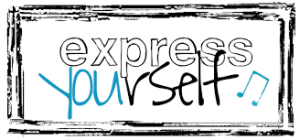
As you prepare your recital piece and practice everything on your assignment sheet, think of this famous “ABarr” quote:
“When should a musical person play musically? ALWAYS!”
What can you do to make sure that, no matter whether you are playing your scales, technical exercises, memory piece or improvs, you are always playing your best? What are the components of musical playing? How can you make your expression unique to YOU?
Session 3 -Weeks 2/3 – Creative Practicing Blog, March 13, 2017

Right now, the May 13 Master Class for High School students and the June 9 Spring Recital seem very far away. However, think about this – learning your recital piece can’t really be done well at the last minute. Unlike cramming for a test, playing a piano piece at a high level in a performance setting requires a complete and deep cooperation between your mind, body and spirit – a kind of peak performance that is only trained in over a long period of time. At what stage is your piece right now and how far do you have to bring it for you to feel completely prepared and comfortable in performance? How far in advance will you be ready for the Master Class and/or the recital? How much time should you be spending on it every day and every week to reach your goal?
Session 3 – Week 1- Creative Practicing Blog, March 6, 2017

Last Saturday, I visited my first piano teacher, Mrs. Betty Swist Holderried, at her home in Westwood. We chatted nonstop for over an hour and it was a pure delight. I brought along flowers, cookies and a very old beginning piano book which had Miss Swist’s handwritten instructions for me. We discussed what I remembered about my lesson and talked about her teaching life since then (sometime in the early 1960’s) when she was in college as a Music Education major. Miss Swist gave me a wonderful start in piano and inspired me with her warmth, love and caring. She put stickers on the heads of the Dozen a Day drawings, which is probably why I have done that for my entire teaching career!
I feel very fortunate that I was able to reconnect with my first teacher and let her know what a great start she gave me. Think about some of the very first things you learned at the piano and how they are relevant and important skills for EVERY level of playing. What are some of those “foundational skills” and how can you pay attention to them every day at every practice session?
Session 2 – Weeks 11/12 – Creative Practicing Blog, February 27, 2017

Have you ever gone somewhere, seen a piano and just wanted to play something? A few people memorize music very easily, but most pianists have to work at learning to play something from memory, me included! What are some benefits of learning a piece from memory? What piece or pieces would you like to learn from memory? Our new studio project, starting the week of March 6, will be to select a piece and start to memorize it (not for performance.) I’ll hand out the “Project Memory” sheet to help us with this project. Happy Memorizing!
Session 2 – Week 10 -Creative Practicing Blog, February 6, 2017
Congratulations to all of you who have finished or almost finished the draft of your composition! Our book will be so exciting with all of you represented in it! Since you want your piano classmates to be able to enjoy your composition, write it as clearly as you can.
The ? this week: Have you practiced as fully and well as you are able? If not, why not? If you did, what helped you have such a great week?
Session 2 – Week 9 – Creative Practicing Blog, January 30, 2017
As you write your composition, you are probably trying to figure out how to notate the rhythm — what time signature to use, what kinds of notes to use and where to put your bar lines. Some of you are writing “unmetered” pieces, those with no time signature or bar lines. How does a composer decide what time signature applies to his/her piece? How do you know you have chosen the right one? How do you justify NOT using a time signature in your piece? How do bar lines help us read music? Tip: your current or past pieces can help you decide if your chosen time signature is the right one!

Session 2 – Week 8 – Creative Practicing Blog, January 23, 2017

There is nothing easy about composing. We look at a blank staff or sit down at the piano, searching for ideas that will stand the test of time and that we are proud to put into a permanent form in the Composition Book 2017. Since everyone is now working on a composition, either using handwritten manuscript or “Noteflight,” I would like to ask some questions about this process. What would you like your composition to convey? What structure or form do you want it to take? Can you write it in such a way that others might play it and find it satisfying? Are you able to apply what you already know about music notation?
The creative process very challenging. It makes you realize what Beethoven must have felt like. It takes time and hard work. I know you will each come up with something very exciting!
Session 2 – Weeks 6/7 – Creative Practicing Blog, January 9, 2017
The piano is an amazing “machine” and we are in complete control of it through the way in which we play it. In 1710 when Bartolomeo Cristofori finished developing the first piano, he opened his Florence, Italy, workshop up to royalty from all over Europe. There is a famous drawing of people practically fainting as they tried out the instrument! What was it that made this new “Gravi Cembalo col Piano e Forte” (Large keyboard with soft and loud) SO immediately sensational and amazing? Is that excitement still there for us today as we play a recital or practice in our own home? Why and how? 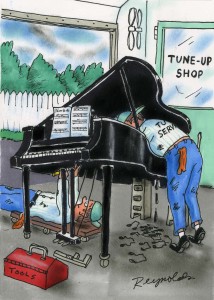 Session 2 – Week 5 – Creative Practicing Blog, January 2, 2017!
Session 2 – Week 5 – Creative Practicing Blog, January 2, 2017!
 2017 is here! We are off to a fresh start, polishing our recital pieces and beginning our compositions for our 2017 Composition Book. It’s a great time to remind ourselves that our daily practice is not just ONE piece, but all the assignments that make up our curriculum. Just as we have more than one subject in school and have to juggle, the same is true of piano assignments. There is so much to learn! I’ll be assigning BLOG, SCALES, COMPOSITION, TECHNIQUE, PIECES ( 2 or 3) in various stages of learning, and perhaps some SIGHT-READING, ENSEMBLE or MEMORY work. I’ll help you figure out how to satisfy practice requirements on ALL your assignments, so your growth is fast-paced and well-rounded pace.
2017 is here! We are off to a fresh start, polishing our recital pieces and beginning our compositions for our 2017 Composition Book. It’s a great time to remind ourselves that our daily practice is not just ONE piece, but all the assignments that make up our curriculum. Just as we have more than one subject in school and have to juggle, the same is true of piano assignments. There is so much to learn! I’ll be assigning BLOG, SCALES, COMPOSITION, TECHNIQUE, PIECES ( 2 or 3) in various stages of learning, and perhaps some SIGHT-READING, ENSEMBLE or MEMORY work. I’ll help you figure out how to satisfy practice requirements on ALL your assignments, so your growth is fast-paced and well-rounded pace.
The newly-designed “Practice Check-In” card will help us keep track. I’ll hand it out at the first lesson in 2017. Please bring it to every lesson so we can discuss how everything went during the week.
I can’t wait for the renewed energy and excitement that 2017 will certainly bring!
Thanks, Mrs. Barr
Session 2 – Week 3 – Creative Practicing Blog, December 12, 2016
Musical symbols and terms give us a great deal of information on how our piece should be played and interpreted. Have you looked closely at every marking or term in your recital piece? If not, this would be a great time to do that! Let me know what you find out – are there any unfamiliar terms or markings. What do you think they mean? If you don’t know, please look them up. Following these instructions can add a lot to the expression in your piece!
Session 2 – Week 2 – Creative Practicing Blog, December 5, 2016
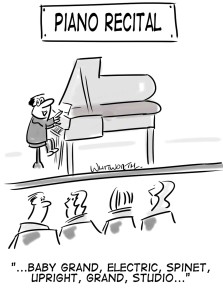 In just about a month, we’ll have our recital at the James Library. The piano there, as most of you know, is a Steinway Grand “B”, which means it is almost seven-feet long. We get used to our home piano and also our lesson piano at Mrs. Barr’s studio, which is a Steinway “M.” However, it may be difficult to adjust and have our best performance on a piano we only play a couple of times a year. What can we do before and during the recital performance to have a smooth and successful adjustment to a different piano? What should we focus on while we’re playing in the recital to help us perform to the best of our ability?
In just about a month, we’ll have our recital at the James Library. The piano there, as most of you know, is a Steinway Grand “B”, which means it is almost seven-feet long. We get used to our home piano and also our lesson piano at Mrs. Barr’s studio, which is a Steinway “M.” However, it may be difficult to adjust and have our best performance on a piano we only play a couple of times a year. What can we do before and during the recital performance to have a smooth and successful adjustment to a different piano? What should we focus on while we’re playing in the recital to help us perform to the best of our ability?
Session 2 – Week 1 – Creative Practicing Blog, November 28, 2016
In two weeks, we’ll be sharing our recital pieces with an audience — the person waiting for the next lesson (or the person before you if you are the last student of the day!) What is your piece about? What emotion(s) do you want to express through it? How will you be sure that your listener feels/hears that emotion? Think about this while you practice and you will make your piece not only technically correct but also beautiful and expressive.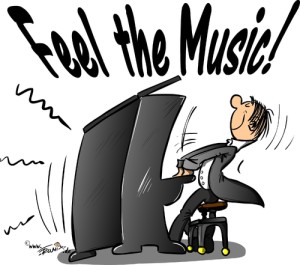
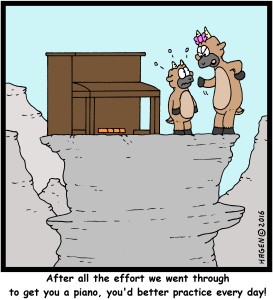 Week 1 – Creative Practicing Blog, September 5, 2016
Week 1 – Creative Practicing Blog, September 5, 2016
Hello Students! Welcome to my first “Creative Practicing” blog. This will be a weekly paragraph, starting with a question for discussion at the beginning of your next lesson! And, there will always be a funny cartoon about practicing. In the future, YOU can actually contribute an original cartoon for posting!!
Please plan to spend a few minutes writing your thoughts down so you’ll be ready.
This week’s question:
So, why practice? And if you’re thinking you can give a quick answer like “To get better,” FORGET IT! Think about things you practice doing on a regular basis and how those activities have been improved by practicing them. Have you gotten stronger, have your skills developed, have you progressed to a higher level? Have you enjoyed yourself more?
Think about it. I can’t wait to hear what you have to say!!
Thanks, Mrs. Barr
Week 2 – Creative Practicing Blog, September 12, 2016
Thank you in advance for your great responses to Week 1’s question. And many thanks to Melissa Trulby, Max and Lauren’s mom, for discovering and forwarding this fantastic cartoon!
For Week 2, we are taking on a more serious QUESTION:
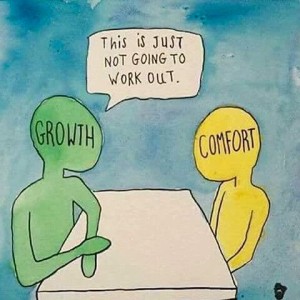
What keeps us from practicing our best every week or every day? Is it only being under a TIME crunch? The two to our left are in a struggle of some sort. Does their struggle apply to practicing in any way?
If we want to learn and get better at something – to grow – that requires us to step out of what feels comfortable and do some hard work. Sitting on a piano bench with your music open in front of you does’t seem that hard, or is it? What makes it hard and what could make it easier?
Please come to your next lesson with “food for thought” about how you can learn to leave your “comfort zone” and accomplish great practicing!
Thanks, Mrs. Barr
Week 3 – Creative Practicing Blog, September 19, 2016
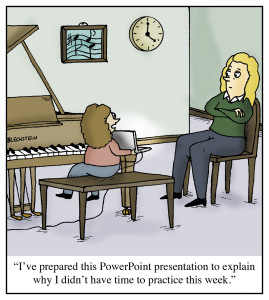
All your responses so far have been WONDERFUL! Remember that reading and thinking about this blog will be a regular weekly assignment. Please do it BEFORE the day of your lesson, so you have time to think about it throughout the week and so we can have a great discussion.
When I think about TIME, I wonder how we all seem to have so little of it! Some of our time is spent on requirements, like going to school or coming to a piano lesson. Some of our time is spent doing things we need to do as human beings- eating, sleeping, going to the dentist. Some of it is spent on pleasurable and important things like being with family and friends. And, if you’re anything like me, some of your time is spent on things that just aren’t that meaningful but are relaxing and easy — like binge-watching Stranger Things. (This show may not be appropriate for all age groups…)
So many choices! So, the question this week is: How can we make piano practicing a priority among all the other time consuming things we do?
(Hint: Remember that, when you have school or a sports practice, or even a dentist’s appointment, you have to show up at an appointed time and there is a very clear structure to that time. This is NOT true of piano practice, even if someone is reminding you to do it! You have to structure it yourself and make sure it fits into your day. Is this possibly why it’s hard to find the time?)
Note – My High School students know that I don’t accept “I didn’t have time” as a valid excuse for not practicing. You always have the time, you just may not have made it a priority in your schedule during a particular week Everyone has a bad week now and again, but, in general, you have to show up at the piano! Then, and only then, can you have productive and exciting practicing! Think about this as you consider your answer.
Week 4 – Creative Practicing Blog, September 26, 2016
We all have them – distractions! I know I do. I am trying to get to the piano today for MY practice time and so many things are getting in the way! Clean the fish tank, do the laundry, go out to th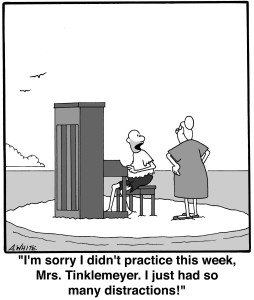 e copy place. The gentleman in this cartoon (what do you think his name is?) is having problems with distractions in a place that seems to be distraction-free. Think about that!
e copy place. The gentleman in this cartoon (what do you think his name is?) is having problems with distractions in a place that seems to be distraction-free. Think about that!
Last week, we talked about time and making piano practice a priority, but sometimes that isn’t enough. What can you do to help yourself get through the distractions and get to the piano on a regular basis? What are your most distracting distractions? (This does not include your regular responsibilities and activities.) Let’s post them on the board when we discuss this question!
Thanks, Mrs. Barr
Week 5 – Creative Practicing Blog, October 3, 2016
The other day, I was at the Y and the grandmother of one of my former students, now a junior at Amherst College, approached me. “You know,” she said, “Danielle is playing piano every day before her classes start.” Keep in mind that this young woman is NOT a Music Major, and that she is among many of my former students who continue to play long after they have left the studio. In fact, they come back and show me what they are playing and composing and sometimes even send me videos.
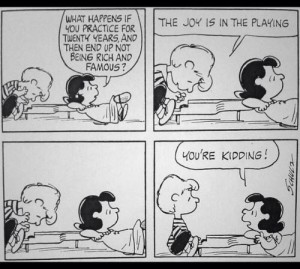
What does this mean for you personally? When you look at Schroeder is this cartoon, can you imagine yourself being somewhere in your future life, playing the piano for your own satisfaction? (I hope so!!!) Does that have any effect on your day-to-day practicing and the level you try to achieve while in the studio? Food for thought.
Weeks 6/7 – Creative Practicing Blog, October 17, 2016
Practicing well requires concentration and focus. And when you’re practicing your best, you’re certainly NOT looking for “perfection,” but instead you’re listening for improvements in specific areas: Did I play that difficult rhythm correctly? Did I add the dynamics as I intended? As you practice, you are being YOUR OWN TEACHER (nice and kind just like Mrs. Barr!) You’re constantly listening and evaluating each repetition until you can hear the improvement. What strategies can you employ every single day to be the BEST teacher you can be in your own practice sessions?
Cartoons wanted! If you have an idea of a cartoon about some specific element of practicing, please let me know. I’ll be able to use it soon. Thanks! – Mrs. Barr
Week 8 – Creative Practicing Blog, October 24, 2016
 Pretty much anyone in the studio could read this music, right? Not only are the notes easy, but also, the letter names are written in. In our studio, however, we want to get to a MUCH higher level of music literacy (reading,) don’t we? Your daily practicing depends on you being able to read music, just like your ability to do your homework well requires you to be able to read it. (Your ability to answer this blog question also depends on your ability to read it!) The better you read music, the more easily you can learn your new pieces. Why is “music literacy” so important to us as pianists and how can we improve our skills during our regular daily practice sessions? Think of a few answers and please jot them down if you need help remembering them! Thanks – Mrs. Barr
Pretty much anyone in the studio could read this music, right? Not only are the notes easy, but also, the letter names are written in. In our studio, however, we want to get to a MUCH higher level of music literacy (reading,) don’t we? Your daily practicing depends on you being able to read music, just like your ability to do your homework well requires you to be able to read it. (Your ability to answer this blog question also depends on your ability to read it!) The better you read music, the more easily you can learn your new pieces. Why is “music literacy” so important to us as pianists and how can we improve our skills during our regular daily practice sessions? Think of a few answers and please jot them down if you need help remembering them! Thanks – Mrs. Barr
Week 9 – Creative Practicing Blog, October 31, 2016
When you practice the piano, you are probably ALONE. But, piano is one of the most social instruments there is. Here’s Schroeder playing for t he whole Peanuts gang, and, even though his posture is pretty poor, he is giving them a lot of enjoyment! We have completed eight weeks of lessons this fall, so you most likely have something you can play for someone else – your parents, siblings, friends. Why is it SO important to share your music with other people, either in the Thanksgiving Playathon (you can still join up for November 19th!), our recitals and group classes or in your very own home? What can YOU gain from that experience?
he whole Peanuts gang, and, even though his posture is pretty poor, he is giving them a lot of enjoyment! We have completed eight weeks of lessons this fall, so you most likely have something you can play for someone else – your parents, siblings, friends. Why is it SO important to share your music with other people, either in the Thanksgiving Playathon (you can still join up for November 19th!), our recitals and group classes or in your very own home? What can YOU gain from that experience?
Week 10 – Creative Practicing Blog, November 7, 2016
I know that students are often tired when they come to lessons and probably also when they are practicing. There are too few hours in the day and we almost NEVER get enough sleep. I encourage you all to be “alert, alive, awake and aware” when you come into the studio for your lesson. Piano deserves your BEST – your best energy and enthusiasm. What can help you bring those to your lesson and, most importantly, to your practice sessions?
Thanks to Melissa Trulby for sending along this great cartoon!
Week 11 – Creative Practicing Blog, November 14, 2016
It’s hard to believe that we are now in Week 11 of lessons! Our recital is on Friday, January 13, 2017 – a very LUCKY day! Most everyone has a piece selected and has already started to work on it. We want the recital to be a valuable experience – if not FUN exactly, then certainly something we can feel good about and learn from. We can also benefit from supporting our fellow students and hearing all of their pieces! What are some ways in which you can start NOW to make sure you have a positive recital experience in January? Try to be creative in your thoughts and not just go for the obvious – “Learn my piece!”
Week 12 – Creative Praticing Blog – November 21, 2016
You have all grown up accustomed to having technology at your fingertips. It can be a great benefit, but also a distraction. The question this week is broad, so answer it from as many angles as you can: Does learning to play the piano have anything in common with using IPads or IPhones? How is learning piano DIFFERENT? How does technology benefit our study? How does it distract us? Think about this carefully and be ready to discuss!



